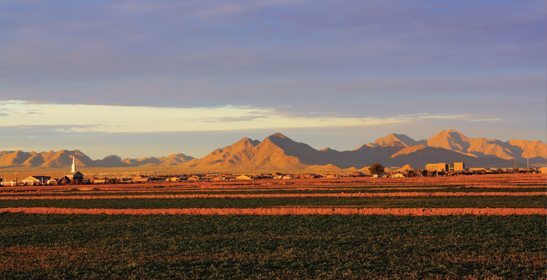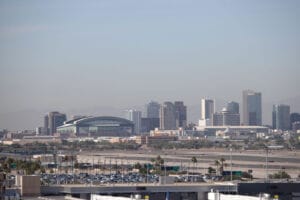The future of Arizona’s economic development is one that is still being decided. In order to help push Arizona in the right direction, Valley Forward has launched an initiative called Arizona Forward.
The more than 40-year-old group brings together business and government leaders to help improve the environment and livability of communities in the Valley. Arizona Forward is an idea that Valley Forward has had in the works for years. Until now, however, the organization hasn’t had the funds to act on the idea. That all changed recently when the group received a grant that will fund the initiative for one year. Depending on the results it drives, the initiative may or may not look for additional funding.
“Our areas of focus have a far greater impact than the immediate geographic location we currently serve,” Diane Brossart, president of Valley Forward, said at a luncheon in February. “Arizona cities and towns are facing many common issues that should be addressed holistically and statewide.”
Arizona Forward will focus on bringing together cities and businesses to effectively put Arizona on the right path toward growth and sustainable development, turning ideas into reality.
“Arizona Forward will bring the business community, large companies and small businesses, and the government sector together to begin the dialogue,” Brossart said. “We want to reach consensus and drive a balanced public agenda.”
The initial goals of Arizona Forward are to establish cooperative relationships, convene public dialogue to improve Arizona’s sustainability, increase awareness and interest in the environment and serve as a technical resource for environmental issues in the state.
The main region Arizona Forward will focus its efforts on is the Sun Corridor, the area stretching from Phoenix to Tucson, which is home to 80 percent of the state’s population.
The Sun Corridor is a prime area for development in Arizona, and projects already are in the works, according to Morris Mennenga, president of the Central Arizona Regional Economic Development Foundation and president of
Discovery Building Companies.
“There were some great things happening in the Sun Corridor and then the recession came on,” Mennenga said. “They’re coming back into play now. For example, we’re putting in an incredible infrastructure in that area. There will be an I-10 expansion (six lanes) that will stretch all the way to Tucson.”
According to Lisa Lovallo, chair of the Tucson Regional Economic Opportunities and vice president and systems manager of Cox Communications, Southern Arizona, there are several issues that businesses and communities in Arizona need to focus on in order to have successful economic development in the Sun Corridor. Those issues include: high-skill high-wage jobs, a vibrant urban core, education, and government.
Creating high-skill high-wage jobs means bringing industries such as aerospace, biotechnology and information systems and logistics to Arizona. There is a need to make Arizona attractive to those industries so they will want to expand their business to the Sun Corridor. That in turn will bring development to the corridor — development that needs to be managed responsibly.
 “It will be a balance between economic development and economic equality,” Brossart said. “Our focus is going to be the issues related to land planning, open space, transportation, air quality issues, water management and energy.”
“It will be a balance between economic development and economic equality,” Brossart said. “Our focus is going to be the issues related to land planning, open space, transportation, air quality issues, water management and energy.”
Gov. Jan Brewer signed new legislation in February that will make it easier for Arizona to recruit businesses to the Sun Corridor.
The new legislation, called the Arizona Competitiveness Package, includes business incentives and tax reforms that are designed to stimulate Arizona’s economy.
Another key opportunity for economic growth for Arizona lies with the solar industry. For a state that sees more than 300 days of sunshine a year, the chance to be at the front of the industry’s development is huge.
“There are a lot of good things happening in solar,” Lovallo said. “If we can keep the government positive to business corporate expansion, there’s no reason businesses won’t want to be here showing off their solar capabilities.”
The biggest challenge Arizona Forward faces is finding solutions that all Arizona cities can agree with and put into effect.
“For so long we have operated as separate cities,” Brossart said. “We’ve been focusing on Phoenix or Scottsdale instead of focusing on how we can market and benefit Arizona as a state.
“We have to do a better job of finding our commonalities between cities so we can make a difference in ensuring long-term development,” she added.
In terms of that long-term development, Arizona Forward will use data collected in 2008 by the Urban Land Development Institute during a Reality Check visioning exercise. ULI collected data from 300 Arizonans who worked together in groups to envision future job centers, transportation lines and housing.
While Arizona Forward will initially focus on the Sun Corridor, plans are to take the initiative to other parts of the state and work with existing environmental and economic development groups.
“It is not our intent to duplicate efforts already underway in areas outside our traditional jurisdiction or to undermine existing civic structures,” Brossart said at the February luncheon. “Rather, we will foster relationships, build coalitions and maximize resources toward a sustainability agenda.”
Bill Pepicello, chair of the Greater Phoenix Economic Council and president of the University of Phoenix, says Valley leaders have to step up to the job of designing Arizona’s future.
“We think the growth should not be counted on again as we did in traditional areas of retail and real estate,” Pepicello said. “As we look at the cycles of our past we know that if we don’t position ourselves going forward, we’re doomed to repeat those cycles.”
Arizona Business Magazine May/June 2011
[stextbox id=”grey”]
Companies may go out of business, but some are so memorable, they’re hard to forget.
Do you know of any companies that are gone but definitely not forgotten?
Let us know! Submit a company, and let us know if we’re missing any.
We’d love your input.[/stextbox]




